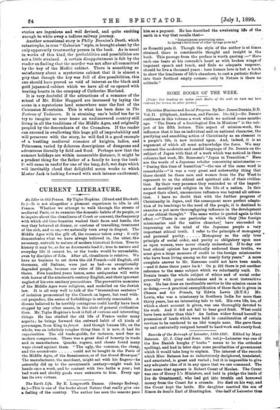SOME BOOKS OF THE WEEK.
[Under this heading we notice such Books of the week as have not been reserved for renew in other forms.] Christian Missions and Social Progress. By Rev. James Dennis, D.D. Vol. II. (Oliphant, Anderson, and Ferrier. 103. 6d.)—Dr. Dennis continues in this volume a work which we noticed some months ago. "The Dawn of a Sociological Era in Missions" is the sub- ject of his fifth lecture. This aspect of mission-work, the influence that it has on individual and on national character, the purifying and ennobling action of Christianity as an element in a people's life, is now insisted upon. And, indeed, it is an argument of which all must acknowledge the force. We may contrast the moderate and candid language of Dr. Dennis on the subject of Japan with that of a work which was noticed in these columns last week, Mr. Ransome's "Japan in Transition." Here are the words of a Japanese scholar concerning missionaries :— " During this time of transition "—the use of the same word is remarkable—" it was a very great and noteworthy thing that there should be these men and women from the Far West to represent to us the ethical and spiritual side of their civilisa- tion. By their very presence they reminded us of the import- ance of morality and religion in the life of a nation. In this respect their silent, unconscious influence was beyond all estima- tion. I have no doubt that with the further progress of Christianity in Japan, and the consequent more perfect adapta- tion of its teachings to the need of the people, it is destined to exercise a yet more thoroughgoing influence in the development of our ethical thought." The same writer is quoted again to this effect :—"There is one particular in which they [the foreign missionaries and the native churches] have succeeded in impressing on the mind of the Japanese people a very important ethical truth. I refer to the principle of monogamy and personal purity Monogamy as the only true principle of social order, and purity as obligatory upon men as upon women, were never clearly understood. If to-day our best ethical opinion has practically endorsed these truths, we must give a large measure of credit to the foreign missionaries who have been living among us for nearly forty years." A more complete answer to Mr. Ransome could not have been made, —and it dates three years back ! On p. 221 there is yet another reference to the same subject which we reluctantly omit. Dr. Dennis treats the whole subject of ethics and of social order generally with great minuteness and in a most instructive way. He has done an inestimable service to the mission cause in so doing.—A practical exemplification of these facts is given in Chenna and his Friends, by Edwin Lewis (R.T.S.) Mr. Lewis, who was a missionary in Southern India for more than thirty years, has an interesting tale to tell. His own life, too, of which a short account is given, was one thoroughly devoted to his work. And it did not fail to bear good fruit. What could have been nobler than this P An Indian widow found herself in possession of lands which were held in consideration of certain services to be rendered to an idol temple near. She gave them up and contentedly resigned herself to hard work and scanty food.















































 Previous page
Previous page